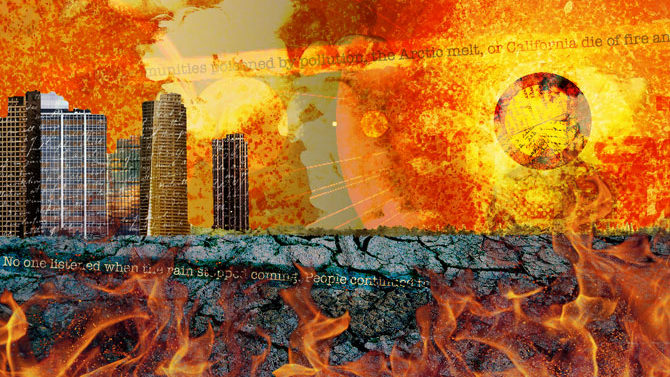World leaders from more than 190 countries have convened in Paris during the first two weeks of December for the long-awaited United Nations Climate Change Conference. Will the governments of the world finally pass a binding global treaty aimed at reducing the most dangerous impacts of global warming… or will they fail in this task?
Letters to the Future, a national project involving more than 40 alternative weeklies across the United States, set out to find activists, authors, artists, scientists and others willing to get creative and draft letters to future generations predicting the success or failure of the Paris talks—and what came after. Some participants were optimistic about what is to come; some not so much. We hereby present some of their visions of the future.
I just flushed my toilet with drinking water. I know: You don’t believe me: “Nobody could ever have been that stupid, that wasteful.” But we are. We use air conditioners all the time, even in mild climates where they aren’t a bit necessary. We cool our homes so we need to wear sweaters indoors in summer, and heat them so we have to wear T-shirts in mid-winter. We let one person drive around all alone in a huge thing called an SUV. We make perfectly good things—plates, cups, knives—then we use them just once, and throw them away. They’re still there, in your time. Dig them up. They’ll still be useable.
Maybe you have dug them up. Maybe you’re making use of them now. Maybe you’re frugal and ingenious in ways we in the wealthy world have not yet chosen to be. There’s an old teaching from a rabbi called Nachman who lived in a town called Bratslav centuries ago: “If you believe it is possible to destroy, believe it is possible to repair.” Some of us believe that. We’re trying to spread the message.
Friends are working on genetic editing that will bring back the heath hen, a bird that went extinct almost 80 years ago. The last member of the species died in the woods just a few miles from my home. Did we succeed? Do you have heath hens, booming their mating calls across the sand plains that sustain them? If you do, it means that this idea of repair caught on in time, and that their habitat was restored, instead of being sold for yet more beachside mansions. It means that enough great minds turned away from the easy temptations of a career moving money from one rich person’s account to another’s, and instead became engineers and scientists dedicated to repairing and preserving this small blue marble, spinning in the velvet void.
We send out probes, looking for signs of life on other worlds. A possible spec of mold is exciting—press conference! News flash! Imagine if they found, say, a sparrow. President addresses the nation! And yet we fail to take note of the beauty of sparrows, their subtle hues and swift grace. We’re profligate and reckless with all this abundant life, teeming and vivid, that sustains and inspires us.
We destroyed. You believed it was possible to repair.
Brooks is an Australian-American journalist and author. Her 2005 novel March won the Pulitzer Prize. Read more letters to the future here.
Like what you just read? Support Flagpole by making a donation today. Every dollar you give helps fund our ongoing mission to provide Athens with quality, independent journalism.






